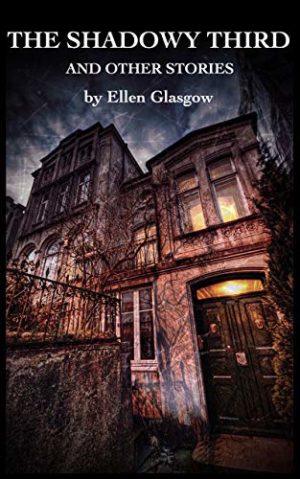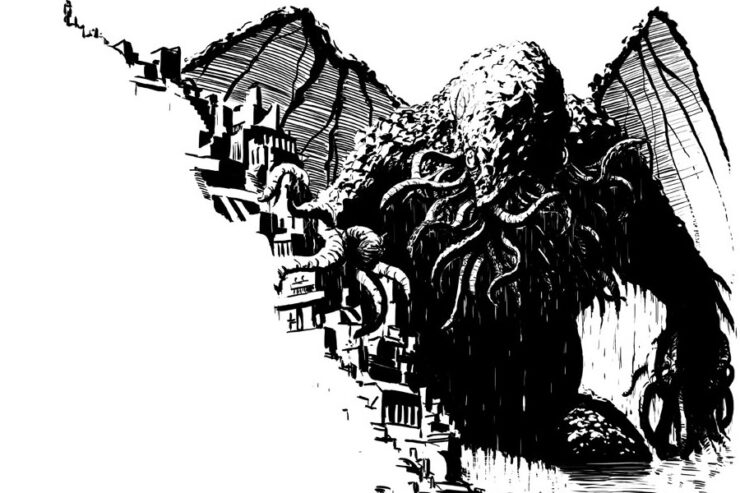Welcome back to Reading the Weird, in which we get girl cooties all over weird fiction, cosmic horror, and Lovecraftiana—from its historical roots through its most recent branches.
This week, we cover Ellen Glasgow’s “Jordan’s End,” first published in Glasgow’s 1923 collection The Shadowy Third and Other Stories. You can find it in Morton and Klinger’s Weird Women. Spoilers ahead. CW for ambiguous euthanasia or suicide.
“Why, that woman will be beautiful when she is a skeleton, was the thought that flashed into my mind.”
As the sun sets on a dreary November day, our unnamed physician narrator drives his buggy to an urgent summons. New to the practice of medicine and this remote Virginia county, he doesn’t know the way to Jordan’s End or the Miss Jordan whose messenger has bid him “come jes’ ez quick ez you kin.” The messenger has directed him to take the Old Stage Road to Buzzard’s Tree, and he easily recognizes this landmark, a dead tree in which buzzards roost. There the Stage Road forks, but which fork to take puzzles him.
An old man toting pine knots emerges from the woods to point him down the rougher fork, a sunken muddy trail. Peterkin begs a ride, and the doctor assents, hoping he’ll prove a useful informant. Turns out Peterkin’s son share-crops at Jordan’s End, not that the farm has prospered since the elder Jordan “went deranged.” With young Alan Jordan laid up, only his wife Judith remains to look after the farm and decaying house. Its only other inhabitants are Judith’s nine-year-old son Benjamin and three “addle-brained” old ladies.
After the War, see, things went downhill for Timothy Jordan. And “sence way back” the Jordans had “gone courtin’” within the family. That was why their blood went bad. Alan’s grandfather and father and two of his uncles have ended up in the asylum at Staunton, hopelessly deranged.
Peterkin alights before Jordan’s End, and so the doctor faces the desolation of overgrown grounds and crumbling Georgian house alone. His door-pounding goes unanswered, but around the back of the house he meets Judith and Benjamin gathering woodchips. Despite her shabby clothing and emaciation, Judith impresses him profoundly. Tall, with dusky hair and eyes “purple-black, like dark pansies,” her loveliness is “not of earth, but of triumphant spirit.”
She takes up the story Peterkin began. Three Mrs. Jordans besides herself occupy the house, her husband’s grandmother and his uncles’ wives. Dr. Carstairs of Baltimore, the country’s leading alienist, should arrive tomorrow, but Alan’s been so restless Judith sent for our narrator today. When she and Alan first married, they worked hard on the failing farm, but they were happy. Three years ago, he began to sink into brooding melancholy, a depression that proved the precursor of the Jordans’ hereditary dementia. Now she must learn whether Carstairs sees any chance for remission.
The house is as dismal inside as out. Superstitious dread fills the doctor, increasing when he glimpses three black-robed figures “impassive as the Fates,” knitting before a woodfire. Judith leads the doctor upstairs to a bedroom in which two field hands watch over Alan, who’s still strong enough in body to need sturdy attendants. Alan, slumped in a wing-backed chair, appears lost in the “impenetrable wilderness of the insane.” He takes no notice of the doctor or his wife, even pushing Judith away before returning to his incessant plaiting of a shawl’s fringe.
Buy the Book


Redwood and Wildfire
Judith walks the doctor back to his buggy. He gives her a bottle of opiate to quiet Alan overnight and promises to return to consult with Carstairs.
The next day the doctor catches Carstairs waiting for his train home. The alienist has declared Alan incurable and advised his removal to the asylum. Early the next morning the doctor’s called back to Jordan’s End. Alan has died. Seeing him laid out, the doctor thinks Alan must look as he did when Judith first loved him, “gone from life… enveloped still in the romantic illusion of their passion.”
Judith stands by the window as withdrawn as if “some spiritual isolation divided her from her kind.” On the mantelpiece stands the opiate bottle, empty.
Outside, Judith tells the doctor that when his illness first began, Alan wanted to die. She made him wait, held him back with a promise.
So she has killed him, the doctor thinks, or at least stood by while Alan killed himself. Either way, he tells Judith he’ll do all he can to help her. Her response is a cry of despair that Alan was her life, and she must go on, tied to Jordan’s End as long as the old women live. She’s sending her son to school. Dr. Carstairs will watch Benjamin and help her when the time comes—while Benjamin needs her, she’ll have no release.
Judith says she’ll send for the doctor at need, but he knows she never will. He watches her walk away “beyond all consolation and all companionship… nearer to the bleak sky and the deserted fields than she was to her kind.”
For a long time the doctor stands gazing at the shawl Judith has dropped to the dead leaves. He doesn’t recover it, instead driving off into the woods.
What’s Cyclopean: The autumnal atmosphere is thick and moody, from the “effluvium of rotting leaves” to the scent of wood smoke and crushed apples.
The Degenerate Dutch: Every mention of “negro” servants is wince-inducing, with the “primitive humanity” of Alan’s companions’ features being the worst.
Weirdbuilding: Those appear to be the three Fates hovering around the house, weaving the lives of men and also baby clothes. Judith’s beauty, meanwhile, is something “straight out of legend or allegory.”
Libronomicon: Our narrator eventually gives up medicine, and turns to writing as “a safer outlet for a suppressed imagination.”
Madness Takes Its Toll: The Jordans all fall prey to the same mental curse. Alan’s father and grandfather both went to asylums. “His uncles went crazy too, an’ the daftness is beginnin’ to crop out in the women.”
Anne’s Commentary
In their introduction to this story, Weird Women editors Lisa Morton and Leslie Klinger note that “Jordan’s End” has been compared to Poe’s “Fall of the House of Usher.” For good reason! Poe’s narrator opens with a description of his solo journey through “a dull, dark and soundless day in the autumn of the year.” Glasgow’s doctor drives through dreary November woods “still as death.” Both answer an urgent summons to the decaying estate of a decayed family plagued by mental illness; upon reaching his destination, Poe’s narrator feels “an iciness, a sinking, a sickening of the heart,” Glasgow’s doctor “a chill depression” followed by “a superstitious dread.” They try to conquer trepidation with sense, but sensibility is stronger and in the end more accurate, for each finds himself on the threshold of a haunted dwelling.
The titles of the stories share double meanings. Poe’s “Fall” is of the House of Usher both as a noble line and as the line’s hereditary dwelling. “Jordan’s End” refers both to the family home and the looming extinction of the family. That Usher’s line and house collapse simultaneously is Poe’s one truly supernatural conceit. Glasgow’s tale features nothing supernatural, unless we count the perfection of beauty and spirit the doctor senses in Judith Jordan. In effect, however, both stories are Gothic to the core.
Impressively, Glasgow works her “weirdness” through realism—it’s the imaginative sensibility of her doctor (who will eventually turn from medicine to literature) that creates an atmosphere of dread out of superb natural and psychological detail.
The first sentence, effortless in its diction, delivers a hard-working image, evocative of place and productive of apprehension; add to that its figurative foreshadowing of plot and theme! Implicit in the forking of any road is a choice that may prove fortunate or fatal. It doesn’t bode well that this fork is marked out by a dead tree full of buzzards and backlit by the last flare of sunset. What Goth wouldn’t love that pic on a T-shirt? Yet it’s no incredible sight, assuming that by “buzzards” Glasgow means turkey vultures, which typically roost in communal groups and therefore favor dead trees not for symbolic value but because they offer unimpeded perching space. There’s nothing unnatural, either, in the way a single buzzard feather drifts down to the doctor’s lap, yet he (and with him the reader) can freight the circumstance with dire warning.
Appearing directly after the dropped feather is a local who’s been gathering pine knots. Nothing uncanny there, and somebody has to provide the doctor with the Jordans’ backstory. What adds the weird touch is how Peterkin, dwarfed and hunched, grizzled and wrinkled, is yet so incongruously vigorous that he might be a gnome or other wood spirit attached to the forking for the perhaps mischievous guidance of mortal travelers.
As Peterkin tells his tale, he and the doctor pass through woods redolent of earth and rotting leaves, with only holly leaves and berries to enliven the dull palette. What would you expect for November? For all his rational training, however, the doctor is a Romantic for whom mundane surroundings conjure “grim tales of enchanted forests filled with evil faces and whispering voices.”
At Jordan’s End he finds fields abandoned to invasive pines and broomsedge, a ragged lawn on which sheep huddle out-of-place, and a house crumbling under rank ivy. Not a pretty sight from a socio-economic POV, sure, but for our doc it’s a “desolation” over which broods “some sinister influence.”
Before long he’ll fashion the Fates out of Judith’s elderly relations, incited by their “lean, black-robed figures” and their cryptic manual business with yarn or straw or perhaps some thread of human destiny soon to be cut. Later the youngest Fate approaches to reveal she’s crocheting a pink infant’s sacque—a sight that revolts the doctor with its incongruity. Or—is the old aunt’s task too appropriate for comfort, given Alan Jordan’s reduction to infantile helplessness?
Jordan’s End is a dark place, actually and spiritually, but to give that darkness a really Gothic punch, Glasgow must contrast it with equally intense light. She accomplishes this in the character of Judith Jordan, as the doctor perceives her. We already know that, however inclined toward imaginative interpretations, he’s an acute observer. Except for Peterkin’s description of Judith as a rapturous bride, he’s unbiased toward her, which makes his immediate reaction more striking. She’s not just attractive—hers is the last face he’ll forget in his life! She’s not just pale and thin—inward light pierces the transparent stuff of her flesh! Her voice puts him in mind of organ music! Such is her perfection in a world of “incessant compromise with inferior forms” that she seems to have “stepped straight out of legend or allegory.” She’s a heroine worthy of playing Light to Darkness, Good to Evil, Delivering Angel rather than murderess or suicide-enabler.
Not in life but on his deathbed, Alan Jordan becomes a hero worthy of Judith, more like the idealized effigy of a knight on his tomb than a mere corpse. Two of the Fates attend him, as do Alan’s young but already brooding son and a “witch of a negress” muttering “an incantation of some sort.” These are Gothic touches enough. More moving is the understated depiction of Judith at a window open on “the ashen November day,” watching as a redbird bursts from a cedar. The heart’s-blood hued bird and its flight from a tree traditionally associated with strength and longevity are a brilliant coda to Glasgow’s opening buzzard-tree image, deftly enfiguring the fulfillment of its dark prophecy. With Alan’s death, Judith’s passionate vitality departs, leaving her after one final cry, one red outburst, to cold resolution and endurance.
It’s a tragedy our Romantic doctor can appreciate. Like the memory of Judith’s face, it will endure until his own end, or at least until in his second career as a writer, he records it in this story.
Ruthanna’s Commentary
Hm. Well, that wasn’t much like Ring Shout at all, was it? I picked Ellen Glasgow’s story out of Weird Women based on the introductory blurb, which described her work set in the post-Reconstruction South, and one of her novels “considered groundbreaking for its realistic portrayals of African Americans and the injustice they suffered.” Even accounting for changing standards, this story is… not that. After a while, I got to bracing myself every time one of the unnamed “negroes” was in a scene. What with the “primitive humanity in their features” and all.
What this story does remind me of is Lovecraft, and particularly “The Lurking Fear.” The ultra-inbred Jordans are likely to turn into cannibalistic apes any minute now. More generally, the terror of mental illness, the absolute lack of hope for improvement or options for quality of life, is both Lovecraftian and all too typical of its time. This is “insanity” as a fall from grace, complete with unhappy angel and attending Fates.
The introduction also suggests similarities between “Jordan’s End” and “Fall of the House of Usher.” I can see that too, at least in the broad strokes. Visitor comes to the ancient seat of an ancient family grown degenerate, and observes the final throes of that degeneracy. And Judith seems like a poetically virtuous beauty, to contrast with the rest of the situation, out of Shelly’s Frankenstein.
Where these comparisons fall down, though (so to speak), is in what in technical literary terminology I’ll call cracktasticness. On a 1-10 scale of Consequences of Familial Affection, Chez Usher collapsing into the tarn beneath a blood-red moon is at a 10 and the blasphemous abnormality of the Martenses amid daemoniac crescendos of ululation hits 11. Meanwhile, the Jordans pick morosely at their shawls. It’s less grotesque, and more like the real quiet unhappiness of dementia. (It’s not in fact quite dementia, either, but it’s certainly closer to real-world mental illness than to gothic drama.) Our medical narrator just reacts to the situation as Lovecraftian narrators often do, by talking around the unnamable, by avoiding solutions to mysteries when they might prove unbearable.
The mystery isn’t much of a mystery—I strongly suspect that Judith killed her husband. Euthanasia is morally pretty gray even when following someone’s earlier expressed wishes; we have no idea what’s going on in Alan’s head by the time we see him, we only know that he can’t express it. “He must have bribed one of the hired hands” seems profoundly unlikely. And while Judith clearly fears that he’s suffering, she’s also mindful of the weight of caregiving—even at the end of the story, there’s no “release” for her until the actual end of the Jordans, until elder widows have died and son has fallen to the family curse. Which latter seems like a big assumption to make, given that her son does in fact have the advantage of outbreeding, but she’s already putting him at arm’s length.
And outside the bounds of anything Glasgow could have known, a long-lived Alan could survive to benefit from mid-century breakthroughs in psychiatry, and his son almost certainly will (if he doesn’t get caught up in World War II first). Which is probably not what you’re supposed to be thinking about when a proud family is failing poetically, but which does seem like a more plausible treatment for slightly dramatized depression than for being a man-eating gorilla.
We’ll be on hiatus until January, when we’ll continue P. Djèlí Clark’s Ring Shout with Chapters 5-6.
Ruthanna Emrys’ A Half-Built Garden comes out in July 2022. She is also the author of the Innsmouth Legacy series, including Winter Tide and Deep Roots. Her short story collection, Imperfect Commentaries, is available from Lethe Press. You can find some of her fiction, weird and otherwise, on Tor.com, most recently “The Word of Flesh and Soul.” Ruthanna is online on Twitter and Patreon, and offline in a mysterious manor house with her large, chaotic household—mostly mammalian—outside Washington DC.
Anne M. Pillsworth’s short story “The Madonna of the Abattoir” appears on Tor.com. Her young adult Mythos novel, Summoned, is available from Tor Teen along with sequel Fathomless. She lives in Edgewood, a Victorian trolley car suburb of Providence, Rhode Island, uncomfortably near Joseph Curwen’s underground laboratory.














